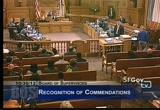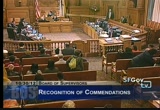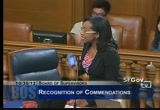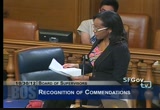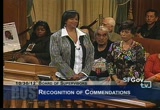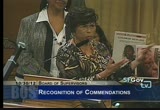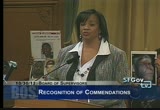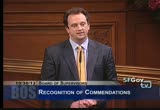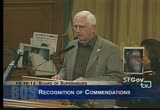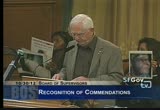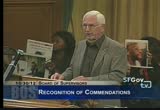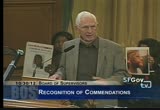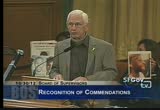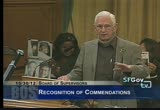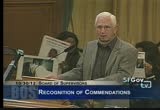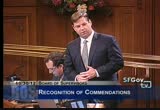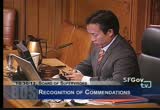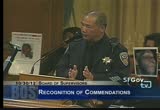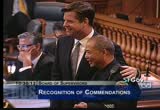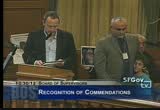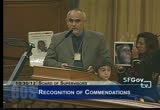tv [untitled] October 30, 2012 8:30pm-9:00pm PDT
8:30 pm
>> thank you very much, ma'am. [inaudible]. >> thank you, ma'am. ma'am, we will hear from you later. thank you. >> there are many people in the [speaker not understood] today in the chamber. but also i want to acknowledge supervisor bevan dufty, if you can stand up, please, sir. former representing district 10 supervisor, now in the mayor's office. (applause) >> >> i'm sorry, sir, you don't have an opportunity to speak. >> he will have an opportunity at the end. >> okay, after. he's got his own proclamation. of course. leave it to bevan to have -- [speaker not understood] to have his own. okay. one more person i do need to acknowledge and that is the
8:31 pm
citizens advisory board. if we have any commissioners, any folks here in the office -- in the chamber that are serve san francisco, can you stand up, please, so we can acknowledge who you are? okay, you're not here? come on, david, stand up. wave your hand, david. aren't you a commissioner? all right, thank you, all right. (applause) [inaudible]. >> that's okay. and our partners in the department of public health, general hospital, san francisco community of behavioral health services, and all of our health care providers, thank you for being with us today. but the real reason why i stand before you is because i come to honor two women, and i actually would be remiss if i were not able to honor -- i could not honor one without acknowledging the other. please put your hands together and please give a warm welcome for ms. lavonne kelham king and
8:32 pm
wanda [speaker not understood]. [cheering and applauding] >> as you can see, they brought their own fan club. i'm not the only one that's a fan of these ladies. i want to read you some shocking statistics. 67% of the youth particularly those that are found in bayview are ex poemsed to at least one adverse childhood experience. 12% are exposed to four or more. this is a testament to the reason why we need our mental health care warriors on the front line every single day. we as a legislative body have a social and fiduciary responsibility to make sure that we continue to fund organizations and fund our community partners that are helping us address thoughtful culturally competent programs that are reaching everyone. so, without further ado, let me introduce to you la vonnekelham
8:33 pm
king. (applause) >> she is a bay area native, i don't want to tell you her age, but 40 years in visitacion valley alone. and she's a parent of a mental health care service recipient and she is also a warrior. she's been working for the city and county of san francisco also for almost 40 years. and she is standing next to her partner in crime, ms. wanda, wanda. [cheering and applauding] >> wanda is also a bay area bayview native born and raised in bayview hunters point. she, too, works for the city and county of san francisco, going on 30 years in december. she's worked for departments like general hospital, the emergency department, as well as san francisco community behavioral health. and collectively these women come together to do work on behalf of an organization
8:34 pm
called nami, the national association of mental illness. and they organize walks. they raise money, and they are sounding the alarm of the importance of doing quality mental health care work. and also giving voice to those persons that are receiving the services and the care. and putting a human face and a human story on many of these statistics. so, please. (applause) >> thank you. all of the supervisors, thank you for this opportunity. i sit on the mental health board with bevan dufty. we tackle some heavy duty situations. i'm grateful to be here with wanda. i want to say to paulette, don't think our hearts don't hurt when we see those pictures. that is why we do the work we do. we received an award in chicago for teaching over 10 classes, family to family.
8:35 pm
and now we are on class 15 and still counting because we don't want to see any more people laying in the street. we want the parents to get involved and that's why it's called family to family. and i make appeal to everyone in this room to reach out and touch a young person's life. and i could go on and on and supervisor cohen, thank you very much. and i'm happy for all of my family who is here, my daughter is over waving, my brother, my sister. this is my sister from the neighborhood. and i told wanda, if we bring both our families up it's not going to be any room up front. but i'll give it turnover to wanda. thank you all. (applause) i just want to thank the supervisors and thank you, supervisor cohen. the work that we do is very hard because it's a lot of significant stigma around mental illness. i want to say the families we teach in our 12-week program they come in and they're hurting, they're really
8:36 pm
hurting. * and they come in like a little kite. by the time the class is ended, they're opened up like a blossom. and it's such a joy to see that happen, for them to get the resources and the information that they need to take care of their loved one. and a lot of times, la vonne, come on, let's go. she would say to mement we work great as a team together and i just want to say thank you. i also want to say thank you to my family and friends, and also to my office staff that's here. i work for [speaker not understood] and i want to thank them for their support. [cheering and applauding]
8:37 pm
8:38 pm
fred, if you'd like to come forward. fred is a long-time resident of district 7, right there in the heart of the district [speaker not understood]. to be quite honest, to be quite frank, mental health is not an issue that rises to the top of a lot of district 7 concerns. i don't hear about mental health issues often at neighborhood meetings, letters, calls. but fred always makes it his top issue. and this is a gentleman who has had a very long successful business career, who has made mental health advocacy really a great part of his life today. and he has done more than just about anybody else to educate me about issues in and around mental health. he's opened my eyes, opened my ears to a lot of issues that prior to coming to the board i had no idea about. and i'm very grateful to fred for doing that. and just within quite frankly the very parochial world of district 7, i give great credit
8:39 pm
to fred for making this issue far more prevalent in the minds of the residents of district 7, helping everybody understand maybe to get back to present truth comments about it takes a village, fred is definitely a very strong advocate on these issues and brings out the message to a lot of people who need to hear that message. and i'm very grateful to you, fred, for all that you've done for me, educating me about the issue, educating the residents of district 7. and separate and apart from mental health, thank you for all that you've done for me on many other issues, all that you've done for district 7 and all that you've done for san francisco over the course of your lifetime, your dedication to all of us is something that is absolutely commendable and i'm very grateful to you for everything you've done. thank you. (applause) i want to commend the board
8:40 pm
for recognizing mental health and for recognizing the people who have devoted so much time and some wonderful effort. but i'd also like to say that this city, when it comes to the treatment of mentally ill, is a failure. and the reason you're a failure is because you've abdicated and you've left the responsibility in the hands of the police. you've put more people in jail and fewer people in the hospital than just about any major city in the country. that's right. you began and supervisor chiu, i want to talk to you at this time. you said mitch katz convinced you laura's law was wrong. laura's law works. nevada shows, city of new york with kendra's law shows that kendra's law can and will save lives. it gives the police a tool so that people can be treated
8:41 pm
instead of jailed. and your mental health court in san francisco proves it. i think that all of you would do well to attend the graduation ceremonies and see the people who have been treated and rehabilitated. dr. peter [speaker not understood] described mental illness, it is a physically-based illness, a disability of the brain and the person. unless the person is defeated -- unless that person is treated, they will be defeated, for their brain cannot work. and you can pass all the laws saying, don't pan handle, but if people have a mental disability where they can't comprehend the law -- and i watch it on my own street. the people -- the mentally ill people on our street are my friends. i talk to them. i try to convince them to take their medicine. one guy wanted to fight with me. i said, i'm not going to fight with you. one of us is going to hurt. they sleep at the foot bridge
8:42 pm
down at the school nearby. and i saw the custodian trying to lead somebody out, and i explained to him that this person is mentally ill, what was wrong with him, what could be done to save them. now, mitch katz went down to work on mental health ward to keep his medical license. if you talk to a psych emergency services doctor they'd tell you he didn't know what he was doing. they'll tell you further he forced out dr. bob oken as the chief psychiatrist in san francisco. bob oken is one of the greatest psychiatrists in the world. he's a pillar of doctors without borders. he's treated people around the world. he was the director of mental health in massachusetts. he was a director of mental health in new hampshire. he's practicing on market street in private practice now. the reason he was forced out is because he wouldn't get people out of the acute ward beds when they were going to die on the streets because they hadn't been stabilized.
8:43 pm
and if you take people and you put them in a ward, you can stabilize them. and jennifer johnson, who is the deputy public attorney who handles cases in the mental health clinic, she said, you know, she represents 160 clients. if they were treated and as they're treated, it makes a difference. their lives are saved. i came to this city after i came back from korea in the '50s. i had the privilege of writing a story about the giants coming to san francisco. and i worked in the california legislature and the oregon legislature. and i saw the beginnings of the current law. there are civil rights laws. there is nothing wrong with that, except that the idea was you just get them back on the streets and they're all going to get well. you get them out of the state hospitals, they're all going to get well. well, first of all, they can't handle their medication. they can't handle treatment.
8:44 pm
they have to be put in a ward or they have to be put under laura's law where their medication is supervised. if you're going to give them a chance to live. and the people who aren't treated are the people who self-medicate and they have a major portion of the street drug clients. they're the people who self-medicate on alcohol. and when i was putting together two major programs in berkeley which were teleconferencing [speaker not understood] berkeley and ucsf on mental health and public policy and mental health and law, and you can look at those programs by going to mental health law symposium, all of them together on the web and see what those people said. and the last putting together, willie brown, and i know willie brown for years. and i said, willie, i think the majority of your homeless are mentally ill. he said majority? he said you're way too conservative.
8:45 pm
he as said the vast majority. he said if i could get them to take their medication, i could save this city millions and millions of dollars. the department of health talks about saving money, you're not saving money. you're spending all of that money and way more in police and enforcement activities. you're putting people in prison for life. and look at the guy who was put in prison who was a truck driver. they couldn't handle him because he was schizophrenic, paranoid schizophrenic. so, they put him in zoll tear i for a year. when he came out he wanted to sue the state. the state wouldn't let him. so, what did he do? he planted his 18 wheeler in the side of the state capital and cost the city $80 million. i just want to mention one more thing, and that is that i have a very dear friend who is
8:46 pm
indicted for murder in san francisco. he cut off the head of a man over -- alleged he cut off his head. he hasn't been tried. in the office depot at geary and [speaker not understood]. this man has been to my house. his father is one of the foremost authorities in the world on chinese art. his siblings are afraid of him and would never let him in the house. we knew he was collecting arms and ammunition. we knew he had a problem. i broke up a series of incidents. if you had had laura's law and the police had picked him up time and again, if you had had laura's law, he could have been treated and that man would not have died. and that wasn't the man he was looking for. that man was an accident. we know who he was looking for, and we don't know whatever happened to his girlfriend and
8:47 pm
their baby. so, anyway, what i'm saying to you is get real. get advice and understand what mental illness is, and let's flesh out the facilities in san francisco and take them out of the prisons and out of the jails and treat them so that they can live like the rest of us. thank you very much and thank you, sean. (applause) >> thank you, supervisor elsbernd. our next presentation will be our colleague from district 2, supervisor farrell who also is going to present for supervisor chu. >> thank you, president chiu. colleagues, today i get the honor of bringing forward someone, a great resident in my district and someone who has been super active not only in our neighborhoods, but also in the mental health board and
8:48 pm
that's glenn ford. glenn, where are you? come on forward, lynn. (applause) >> colleagues, i'll let you know a little about lynn. she's a native californian, lived in san francisco since 1988. she's an attorney with the united states court, a mother of four. active in our community and on the cal hollow association board of directors and very interested in both brain health and hour owe science. on the mental health board lynn has worked to increase the board standards and content of mhb more engaging and directed. produce more professional annual reports. i think most importantly really worked tirelessly to make sure the interests of the mental health community are well represented not only in the district but across san francisco. she does a great service to her role in the mental health board ask lynn i want to thank you. you've been the district 2 appointee since i came into office. i want to thank you for your service. i know you've been doing it for
8:49 pm
a while and i want to thank you for all of your efforts not just on our behalf but the mental health community. * district 2 behalf want to honor you for serving and thank you for all you do. (applause) thank you, supervisor farrell and thank you, members of the board, for this recognition. given that san francisco has in per capita terms an extraordinarily large population of people suffering from serious mental illness, the mental health board is the most important policy body that most san franciscans have never heard of. the mental health board is charged under state law with a range of important responsibilities designed it provide public accountability for the mental health system for the city and county including accountability directly to the individuals it serves. the law, institution code section 66.4 02 was required to
8:50 pm
assess the mental health impact from realignment of services to state and county on services delivered to clients and the local community. i hope and anticipate that my colleagues and i on the mental health board will rollup our sleeves and tackle this and other statutory goals with vigor this term. to the members of the board of supervisors, i encourage you to appoint individuals of creativity, talent, and vision to the mental health board and to attend our meetings, contribute your insights and ideas, and otherwise support our mission and our endeavors. thank you. (applause)
8:51 pm
(applause) >> colleagues and members of the public, i actually have the honor also of presenting supervisor carmen chu's honoree today and recognizing him. supervisor chu is stuck on the east coast due to the storms out there and, so, i'd like to call up officer rich chu. (applause) >> thanks, officer, for being here. so, colleagues, supervisor chu is honoring officer jew for his work of the homeless outreach
8:52 pm
officer for terra val station. (applause) >> officer ju was hired by the police department in 1990 and during his 22 years he's worked on a variety of assignments. he's worked in uniformed patrol, in plain clothes at the academy in bayview ingleside, northern and terra val stations. for the last 4-1/2 years he has been assigned as a homeless outreach officer. quite often police officers as we know are the point of first contact for people in crisis and many of the individuals that officer ju meets with in his work as a homeless outreach officer have shown serious mental health issues that contribute to their homelessness. officer ju does an amazing job of connecting these individuals with resources to help them off the streets, and into treatment and case management they need with sensitivity and professionalism. supervisor chu really wishes she could be here and we're sorry with the storms, but really wantedth to personally say how much she appreciates all your work on behalf of not only the station and the mental
8:53 pm
health community but the homeless outreach that you do on behalf of terra val station. and it's a real honor to present this on her behalf and thank you for all that you do for our city. (applause) i just wanted to thank supervisor carmen chu for recognizing me for this type of work and the members of the board of supervisors. it's not an easy job to do coming from a law enforcement point of view and trying to stop doing the enforcement part and do more of the service part that we do. but also with the help of hope and the homeless outreach team and department of health -- [cheering and applauding] back there, with the various city agencies and the other law enforcement agencies, it wouldn't be possible to give this type of serves says to the people we contact. but also in addition to helping out the residents in the district because we're trying to educate them, too, as far as what is going on out there in relation to homeless and the mental health.
8:54 pm
thank you again. [cheering and applauding] (applause) >> thank you, and congratulations. i want to take a moment to acknowledge our representative from mayor lee's office, bevan dufty who helps coordinate many of our mental health programs here in the city. he has a couple honorees who have to leave in a couple
8:55 pm
moments so i wanted to give him a moment to do the presentations. >> thank you, mr. president, members of the board. if i could ask [speaker not understood] to come up? [cheering and applauding] >> and i'd like to welcome jason's son to come up, if he'd come up and join us. i've never met him and i hear a lot about him. i've never seen jason in a tie, so, this is a pretty exciting day for me. come on, buddy. on behalf of mayor lee, first let me acknowledge supervisor cohen for partnering with the mental health board to create this event and for all of you for participating and i certainly hope this becomes an annual recognition. i think it is so important to bring recognition. and in this case we're honoring jason albertson.
8:56 pm
jason is someone i've had the opportunity to work with over the past 10 months. i think he is the epitome of a great public servant. jason is involved in leading our homeless outreach team, our engagement team that works with individuals who are on the street and in shelter. he brings the skills of a social worker, a case manager, clinical supervisor, program designer, he's working within department of public health to help redesign our mobile assistance patrol, and he is just an outstanding individual and a very proud dad. and, so, mayor lee is tremendously honored to recognize jason for his leadership award. [cheering and applauding] thank you, and thank you, everybody. thank you to the board of supervisors. i could not do this work without the department of public health behind me. i could not do this work without the incredible team, some of whom are here from
8:57 pm
homeless outreach team. i could not do this work without the outreach specialists who are on the street, who find particularly vulnerable homeless people, who seek to engage with them and bring them to places of shelter. i could not do this work without the mentors who have taught me, who have trained me and who have supported me, some of whom have helped me for 20 years and corrected me when i needed it. homelessness will not end until we recognize the need of the community to end homelessness. the fact that i'm able to have some success is because i have a community standing behind me. and we organize our community to take care of our homeless brothers and sisters, the people who are on the streets, the people who by and large have very little hope, are coping with huge burdens of illness, then we will be successful in dealing with humantarian mission that is the hallmark of the department of
8:58 pm
public health. thank you, everybody, for this award. [cheering and applauding] >> outstanding. and next if i could bring up joe robinson. (applause) >> i want to acknowledge joe as one of the most important colleagues [speaker not understood] at the department of public health in bringing leadership to our public health work in and around issues of mental health. joe brings her background working for the sheriff's department and jail health services, and now is a leader of community behavioral health services. jo has been one of the most important city leaders for our therapeutic court system such as our behavioral health court and other models that really seek to keep individuals who have mental illness out of the justice system and to the
8:59 pm
district 7 honoree we actually have a better court based on what the goals of laura's law were and our lcs court and so many innovations and jo is tremendously respected by all the members of her department and it is difficult because mental health is never run as adequately as it should be, but throughout the organization jo is someone who is respected for her intellect, experience, knowledge and leadership. so mayor lee wanted to recognize and honor jo for her work. (applause) thank you, board of supervisors, mostly for your ongoing support of mental health. when i go to sacramento and meet with my colleagues up there, i feel so privileged to come from san francisco. so privileged to know that our elected officials are incredibly supportive of the health department and of mental health in particular. so, i
141 Views
IN COLLECTIONS
SFGTV: San Francisco Government Television Television Archive
Television Archive  Television Archive News Search Service
Television Archive News Search Service 
Uploaded by TV Archive on

 Live Music Archive
Live Music Archive Librivox Free Audio
Librivox Free Audio Metropolitan Museum
Metropolitan Museum Cleveland Museum of Art
Cleveland Museum of Art Internet Arcade
Internet Arcade Console Living Room
Console Living Room Books to Borrow
Books to Borrow Open Library
Open Library TV News
TV News Understanding 9/11
Understanding 9/11